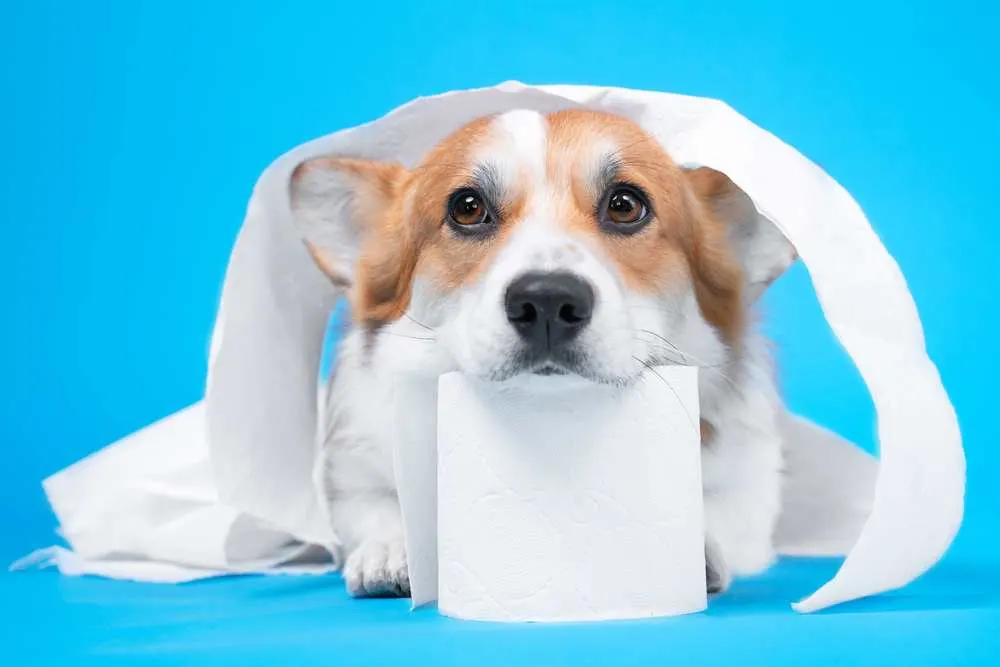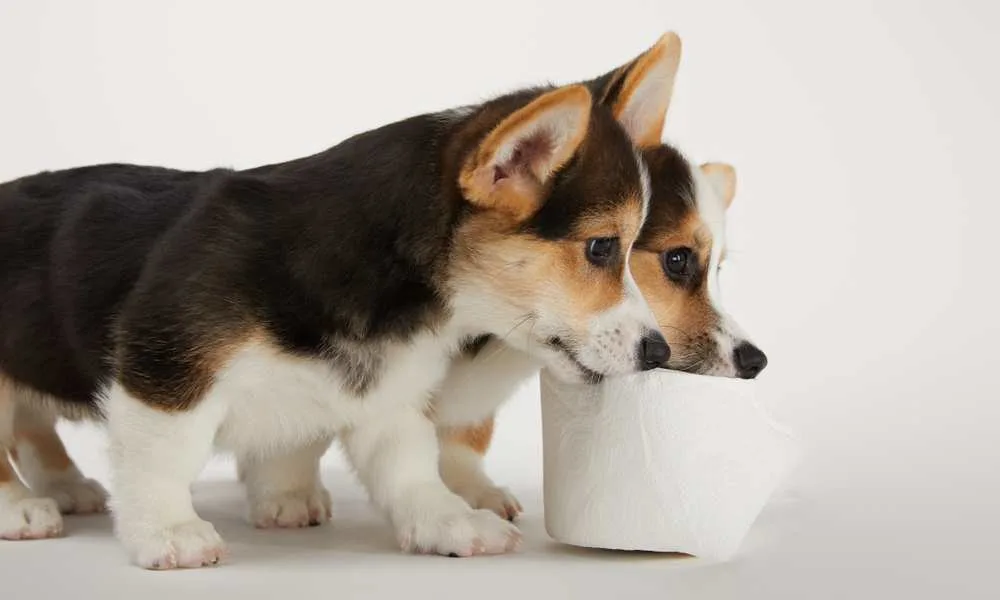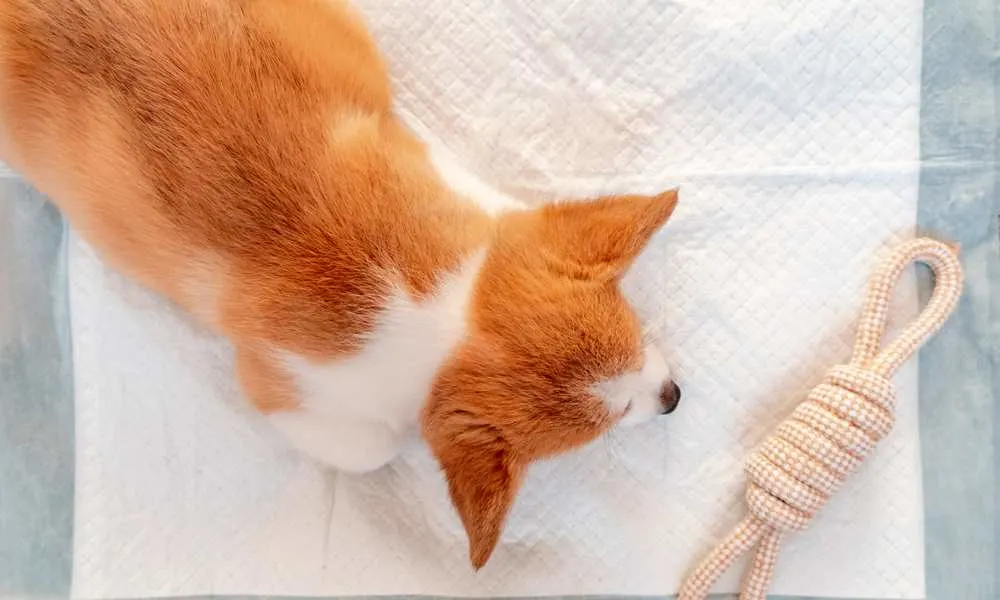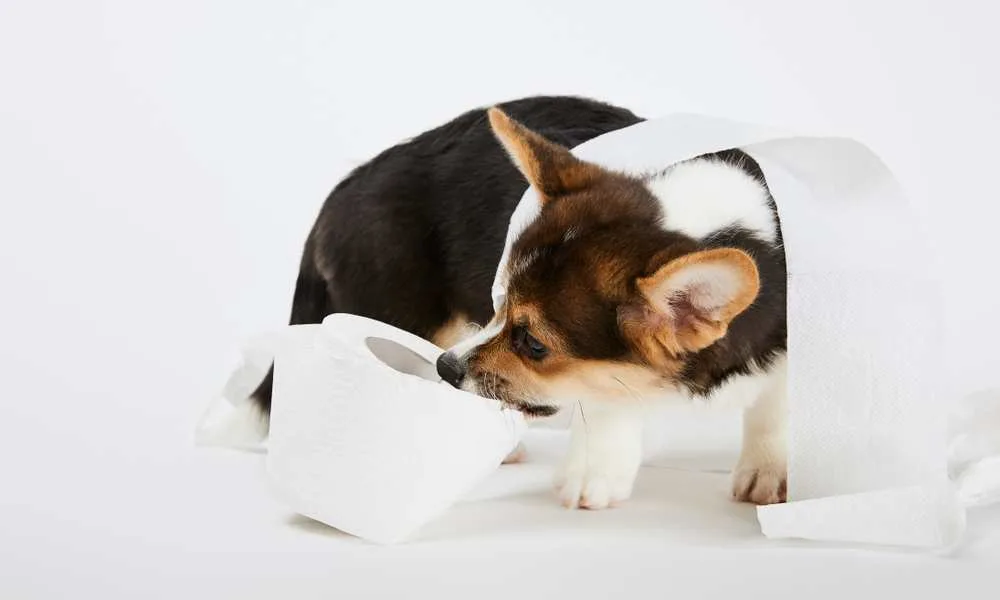There is nothing more stressful for a pawrents than a sick doggo. Watching your fur baby struggle and not being able to tell you what exactly is wrong with him/her is excruciating. So you noticed that your Corgi has more frequent stools than usual, and they are smelly, loose, and liquidy?
Apparently, your bestie is dealing with diarrhea. Diarrhea is one of the most common reasons why pet owners seek veterinary help. But why does my Corgi have diarrhea?
While it can be triggered by a simple change such as a new type or brand of food or treats, doggy diarrhea can also signalize that something is seriously wrong with your puper. However, diarrhea can range from mild and not warranting a vet visit to severe and potentially fatal for your puppy.
This article will cover the variety of reasons why your Corgi may be experiencing diarrhea, how to treat this problem at home, and how to determine when the vet visit is a must. So let’s get going, shall we?

What Is Diarrhea?
Doggy diarrhea is a sign of some particular health problem, and it is never a disease itself. Like already said, diarrhea in dogs is the passing of loose (sometimes liquid) stool more frequently than usual. Diarrhea is a symptom that could be related to problems with your dog’s small or large intestine or any other organ.
The most common reason why diarrhea occurs is that unabsorbed nutrients retain or draw water into the intestines. The volume of excessive fluid retention overwhelms the intestinal lining’s ability to absorb water and nutrients, so the only way to handle the situation is to pass those fluids in the form of liquidy soft stool.
Another widespread reason for diarrhea is the increased permeability of the intestinal lining. If intestines are dealing with inflammation or some irritating substances, it will cause increased movement of fluid and electrolytes and impaired absorption, which results in diarrhea.
This problem can occur suddenly, and this is what we call acute diarrhea. On the other hand, it can last for weeks to months which means your Corgi suffers from chronic diarrhea. In some cases, diarrhea can occur off and on, which is called intermittent diarrhea. The severity of diarrhea depends on the underlying cause.

Can Diarrhea Be Dangerous For Welsh Corgi?
As said, usually diarrhea is not severe, and it is mainly linked to a simple digestive disorder such as change of food brand, overeating, food allergy, and so on. This can be easily and quickly fixed with an adapted diet and following small treatment.
The only thing about diarrhea that might be risky for your Corgi is dehydration. So it is highly recommended to give your Corgi something to drink as often as possible. Adult dogs handle diarrhea easily, while puppies are in greater danger when experiencing diarrhea.
If your puppy has diarrhea, you should keep an eye on him and contact your vet as soon as possible because they are more fragile and likely to become dehydrated very quickly. Also, their immune system may not be sufficient to keep up with diarrhea, so they will need a quick boost and all the help they can get.
When an adult Corgi has diarrhea, you will need to observe him on a daily basis so you can keep an eye on symptoms such as fever, stomachache, blood in his stool, vomiting.
The first thing to do is to put your dog on a diet for at least one day; this means no food and a lot of water, the next day, introduce the “diet” in the form of 3 to 4 small meals per day. Prepare white rice, cooked carrots, pumpkin, chicken breasts cooked in water, and steam potatoes, only fat-free food that is easy to digest.
With this small diet, diarrhea should go down after two days; if that does not happen, then do not wait anymore and visit the vet.

Symptoms And Differences Between Small Intestinal And Large Intestinal Diarrhea In Dogs
Small and large intestinal diarrhea have different causes, and they require different tests to be diagnosed. This also means they require different treatments.
When small intestinal diarrhea occurs, a larger amount of stool is passed down, a mild increase in frequency. Approximately three to five bowel movements per day, excess gas production is rare, but you may notice gas rumbling in the belly. The good thing is that doggo doesn’t strain or has difficulty while pooping. Usually, small intestinal diarrhea is followed by vomiting and losing weight. Sometimes blood may be spotted in the stool, and it is black in color.
On the other hand, when large intestine diarrhea occurs, it always includes the colon and rectum. Dogs will pass small amounts of loose stool very often, more than five bowel movements per day. Pooping is always hard and requires straining to pass the stool. This problem is rarely followed by vomiting or losing weight, and if there’s blood in the stool, it will be red and slimy with mucus.
Learn More: Why Do Corgis Eat Poop?

Small Intestinal Diarrhea
The main causes of small intestinal diarrhea in dogs are canine distemper, parvovirus, and canine coronavirus in young pups who have been poorly vaccinated. Also, bacteria such as salmonella, clostridia, or campylobacter can cause diarrhea if they are present in excessive amounts since these same bacteria can be found in the stool of healthy dogs.
In young pups, the main reason why diarrhea occurs is because of the presence of worms or giardia. We know how mischievous dogs can be, so it is not rare that dogs experienced loose stools when they ingested objects such as bones and sticks. In these cases, objects get stuck in the intestine and damage the lining, causing both diarrhea and vomiting.
A sudden change in diet will for sure cause diarrhea and sometimes even vomiting. Food allergies, toxins like lead, and insecticides as well cause diarrhea.
Diseases such as inflammatory bowel disease (IBD) that is suspected to be an allergic reaction to components of food, bacteria, or parasites will cause diarrhea. Tumors of the intestine, fungal infections like histoplasmosis are as well very common causes of loose stool.
Diagnosis
The cause of small intestinal diarrhea can be determined from performing:
- Blood tests
- Examination of the stool
- X-rays
- Ultrasound of the abdomen
- Endoscopy
Endoscopy is a procedure that involves passing a flexible scope through the stomach into the upper intestine, and it requires general anesthesia. During this procedure, small pieces of the lining of the intestine are taken for microscopic evaluation and biopsy.
Unfortunately, diagnosis of intestinal lymphosarcoma may be missed with endoscopy since doctors only take small pieces of the tissue. To diagnose this cancer, doctors must perform surgery and take larger tissue pieces, including the full thickness of the intestinal wall, considering that the cancerous cells may be deep in the wall.
Treatment
Acute small intestinal diarrhea requires withholding from food for 24 to 48 hours. However, water is a must since diarrhea will cause dehydration. When diarrhea stops, feed your Corgi with small amounts of bland, low-fat food separated in small portions three to six times per day in the next few days.
Gradually increase the amount of food and slowly transition back to your Corgos regular diet. Special diets usually contain rice since this food ingredient is more digestible than all other grains.
Never give your dog over-the-counter diarrhea medications on your own; always first consult with your veterinarian. If your Corgo is still playful and active, eager for food, not dehydrated, and doesn’t have any health problems lately, acute diarrhea can be easily managed at home. In case diarrhea is followed by other symptoms such as vomiting, lack of appetite, lethargy, and if it continues for more than two days, it is time to take your pup to the vet.

Large Intestinal Diarrhea
If your pooch is straining, frequently pooping, defecation is difficult and painful, and you notice some mucus in a stool, then, with obvious exceptions, the problem is large intestinal diarrhea. Since the colon lining is irritated, you can expect your Corgi to have bloody diarrhea as well.
Usually, the main causes are:
- Whipworms
- Polyps
- Inflammatory bowel disease
- Colonic ulcers
- Colonic cancer
- Stress
Diagnosis
The diagnosis is also made by blood tests and examination of the stool for bacteria and parasites. Also, your vet might be considering a rectal examination using a gloved finger to provide some information if he is suspicious about rectal polyps or rectal cancer.
Sometimes even colonoscopy of the large intestine is performed using a rigid or flexible scope passed up the dog’s rectum. These colon exams are usually performed under general anesthesia.
Treatment
The treatment is based on a specific diagnosis. If the cause of the diarrhea is not very serious, a non-specific treatment is included, such as a high fiber, low-fat diet, and sulfasalazine (an anti-inflammatory drug).

Diarrhea In Dogs Outside Of The Intestines
Diarrhea is not always caused by inflammation of the intestinal tract; sometimes, other diseases outside the intestinal tract, including kidney failure, liver failure, and pancreatic disease, will make your dog experience diarrhea.
Diseases like severe inflammation of the pancreas cause pancreatic insufficiency; this condition leads to damage of the pancreas; in this case, the pancreas is unable to make enough enzymes to digest fat. This causes diarrhea with a large amount of greasy stool, and it often occurs in young puppies due to a congenital deficiency of pancreatic enzymes.

Prevention
In some cases, diarrhea is unavoidable; however, there are some things you can do to reduce the chances of diarrhea occurring.
Minimize the stress of the environment. Always provide your dog with a healthy, balanced diet and exercise him regularly, especially if you know he has some food allergies or a bad reaction to some food ingredients. Never feed your Corgi with scraps and keep spoiled food out of their reach.
Make sure all the vaccinations are up to date. This will as well keep the parasites away, which usually are the main cause of diarrhea. Teach your dog not to eat food from the streets; this way, you will prevent him or her from eating plant material, feces, or drink the water from the puddles.

Healthy Diet And Nutrition Tips
A key to a healthy life and stomach in humans is a wholesome diet, so why would it be any different for dogs or any other animal. The right kind of diet will not only keep them healthy, but it will also prevent bouts of inconvenient problems such as vomiting, diarrhea, gasses, etc.
If you feed your Corgi with heavily processed foods that contain high levels of preservatives and chemicals, your dog will for sure have a messy intestinal situation. This kind of food can play havoc with your dog’s digestion, and certain foods can even be poisonous to your furry friend.
Remember any food or treat which is new to your dog is a potential cause of diarrhea. This is particular for a new food brand if it’s changed suddenly. When you decide to change your Corgis kibble brand, you must gradually transition over a few days to a week.
This does not mean you should avoid introducing new treats and food, but you must do it properly and, as recommended, only introduce one food or treat at a time, so in case your dog does develop diarrhea, you can be sure what was an exact cause.
Common Food Mistakes That Can Trigger Diarrhea
Fatty milk or dairy can cause diarrhea in dogs since dogs cannot process fat. Also, fatty food can cause pancreatitis, which may result in other gastrointestinal signs such as vomiting, decreased appetite, gasses, and bloody stool.
Also, not choosing the right kind of food for your dog according to its life stage can cause diarrhea. The nutritional requirements for a puppy are not the same as for an adult dog, senior dog, or nursing mom. If your dog has a chronic diarrhea condition, certain food ingredients should be avoided. Your vet is the best person that you can ask for a piece of advice.
A raw diet is widely popular nowadays, and there are many benefits, such as a stronger immune system, better and shinier coat, improved dental health, and many risks that come with this type of diet.
The most important is the risk of infectious diseases. It is very hard to feed raw and provide a well-balanced diet, in the beginning, so you must be prepared that there will be a lot of fluctuation in your Corgis body mass as well in their stool.
If you decide to feed raw bones, you must be aware that there is a risk of intestinal blockage that causes diarrhea, and in some cases, it even requires surgical removal.
Also, when you feed raw, the main source of food is meat, and some protein sources such as chicken and beef are common food allergens for dogs and cats. If you have changed your dog’s diet recently and you noticed symptoms such as diarrhea, vomiting, itching, or hair loss, you should switch back to the old protein source and see if the symptoms will resolve.
Foods Your Corgi Should Never Eat
You should avoid feeding your Corgi human food and scraps since this will for sure lead to vomiting and diarrhea in the long term. However, some foods are poisonous to your dog, even in small amounts. Those foods are:
- Grapes and raisins
- Onion
- Garlic
- Macadamia nuts
- Chocolate
- Coffee
- Alcohol
- Any food that contains artificial sweetener Xylitol

When Should You Consult Your Vet?
Every dog pawrent goes a bit insane when their fur baby is not feeling well, and that is normal, but you must think about how stressful a vet visit is for your Corgi. Do not drag him to the vet if there is no need for it. Remember, stressful environments can trigger chronic diarrhea in Corgis.
In case of diarrhea, wait for a day or two if the situation is not difficult, or if you do not doubt poisoning, and see if the changed diet will make things better. In case you notice other symptoms such as dehydration, lethargy, fever, vomiting, dark or bloody stool, decreased appetite, then it could be a sign of something more serious, and it is time to call your vet.
Keep an eye on dehydration; dry and tacky gums are the best indication and if that occurs, consult your vet immediately, especially if your Corgi is still a puppy. If diarrhea continues longer than usual, consult your vet for advice, it is always better to be safe than sorry.


